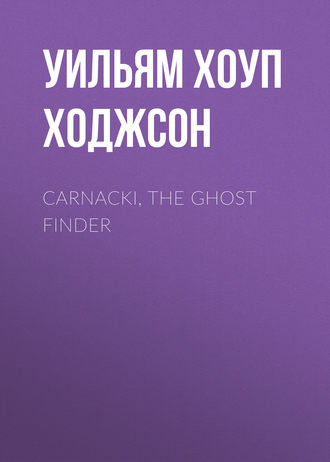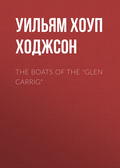
Уильям Хоуп Ходжсон
Carnacki, the Ghost Finder
"And suddenly, without any intention, or realization of what I was saying, I asked the landlord:—
"'What were the feet like?'
"I received no answer; for the inspector was ordering the constable to open the cellar door, and the man was not obeying. Johnstone repeated the order, and at last, in a queer automatic way, the man obeyed, and pushed the door open. The loathsome smell beat up at us, in a great wave of horror, and the inspector came backward a step.
"'My God!' he said, and went forward again, and shone his light down the steps; but there was nothing visible, only that on each step showed the unnatural footprints.
"The inspector brought the beam of the light vividly on the top step; and there, clear in the light, there was something small, moving. The inspector bent to look, and the policeman and I with him. I don't want to disgust you; but the thing we looked at was a maggot. The policeman backed suddenly out of the doorway:
"'The churchyard,' he said, '… at the back of the 'ouse.'
"'Silence!' said Johnstone, with a queer break in the word, and I knew that at last he was frightened. He put his lantern into the doorway, and shone it from step to step, following the footprints down into the darkness; then he stepped back from the open doorway, and we all gave back with him. He looked 'round, and I had a feeling that he was looking for a weapon of some kind.
"'Your gun,' I said to the landlord, and he brought it from the front hall, and passed it over to the inspector, who took it and ejected the empty shell from the right barrel. He held out his hand for a live cartridge, which the landlord brought from his pocket. He loaded the gun and snapped the breech. He turned to the constable:—
"'Come on,' he said, and moved toward the cellar doorway.
"'I ain't comin', sir,' said the policeman, very white in the face.
"With a sudden blaze of passion, the inspector took the man by the scruff and hove him bodily down into the darkness, and he went downward, screaming. The inspector followed him instantly, with his lantern and the gun; and I after the inspector, with the bayonet ready. Behind me, I heard the landlord.
"At the bottom of the stairs, the inspector was helping the policeman to his feet, where he stood swaying a moment, in a bewildered fashion; then the inspector went into the front cellar, and his man followed him in stupid fashion; but evidently no longer with any thought of running away from the horror.
"We all crowded into the front cellar, flashing our lights to and fro. Inspector Johnstone was examining the floor, and I saw that the footmarks went all 'round the cellar, into all the corners, and across the floor. I thought suddenly of the Child that was running away from Something. Do you see the thing that I was seeing vaguely?
"We went out of the cellar in a body, for there was nothing to be found. In the next cellar, the footprints went everywhere in that queer erratic fashion, as of someone searching for something, or following some blind scent.
"In the third cellar the prints ended at the shallow well that had been the old water supply of the house. The well was full to the brim, and the water so clear that the pebbly bottom was plainly to be seen, as we shone the lights into the water. The search came to an abrupt end, and we stood about the well, looking at one another, in an absolute, horrible silence.
"Johnstone made another examination of the footprints; then he shone his light again into the clear shallow water, searching each inch of the plainly seen bottom; but there was nothing there. The cellar was full of the dreadful smell; and everyone stood silent, except for the constant turning of the lamps to and fro around the cellar.
"The inspector looked up from his search of the well, and nodded quietly across at me, with his sudden acknowledgment that our belief was now his belief, the smell in the cellar seemed to grow more dreadful, and to be, as it were, a menace—the material expression that some monstrous thing was there with us, invisible.
"'I think—' began the inspector, and shone his light toward the stairway; and at this the constable's restraint went utterly, and he ran for the stairs, making a queer sound in his throat.
"The landlord followed, at a quick walk, and then the inspector and I. He waited a single instant for me, and we went up together, treading on the same steps, and with our lights held backward. At the top, I slammed and locked the stair door, and wiped my forehead, and my hands were shaking.
"The inspector asked me to give his man a glass of whisky, and then he sent him on his beat. He stayed a short while with the landlord and me, and it was arranged that he would join us again the following night and watch the Well with us from midnight until daylight. Then he left us, just as the dawn was coming in. The landlord and I locked up the house, and went over to his place for a sleep.
"In the afternoon, the landlord and I returned to the house, to make arrangements for the night. He was very quiet, and I felt he was to be relied on, now that he had been 'salted,' as it were, with his fright of the previous night.
"We opened all the doors and windows, and blew the house through very thoroughly; and in the meanwhile, we lit the lamps in the house, and took them into the cellars, where we set them all about, so as to have light everywhere. Then we carried down three chairs and a table, and set them in the cellar where the well was sunk. After that, we stretched thin piano wire across the cellar, about nine inches from the floor, at such a height that it should catch anything moving about in the dark.
"When this was done, I went through the house with the landlord, and sealed every window and door in the place, excepting only the front door and the door at the top of the cellar stairs.
"Meanwhile, a local wire-smith was making something to my order; and when the landlord and I had finished tea at his house, we went down to see how the smith was getting on. We found the thing complete. It looked rather like a huge parrot's cage, without any bottom, of very heavy gage wire, and stood about seven feet high and was four feet in diameter. Fortunately, I remembered to have it made longitudinally in two halves, or else we should never have got it through the doorways and down the cellar stairs.
"I told the wire-smith to bring the cage up to the house so he could fit the two halves rigidly together. As we returned, I called in at an ironmonger's, where I bought some thin hemp rope and an iron rack pulley, like those used in Lancashire for hauling up the ceiling clothes racks, which you will find in every cottage. I bought also a couple of pitchforks.
"'We shan't want to touch it," I said to the landlord; and he nodded, rather white all at once.
"As soon as the cage arrived and had been fitted together in the cellar, I sent away the smith; and the landlord and I suspended it over the well, into which it fitted easily. After a lot of trouble, we managed to hang it so perfectly central from the rope over the iron pulley, that when hoisted to the ceiling and dropped, it went every time plunk into the well, like a candle-extinguisher. When we had it finally arranged, I hoisted it up once more, to the ready position, and made the rope fast to a heavy wooden pillar, which stood in the middle of the cellar.
"By ten o'clock, I had everything arranged, with the two pitchforks and the two police lanterns; also some whisky and sandwiches. Underneath the table I had several buckets full of disinfectant.
"A little after eleven o'clock, there was a knock at the front door, and when I went, I found Inspector Johnstone had arrived, and brought with him one of his plainclothes men. You will understand how pleased I was to see there would be this addition to our watch; for he looked a tough, nerveless man, brainy and collected; and one I should have picked to help us with the horrible job I felt pretty sure we should have to do that night.
"When the inspector and the detective had entered, I shut and locked the front door; then, while the inspector held the light, I sealed the door carefully, with tape and wax. At the head of the cellar stairs, I shut and locked that door also, and sealed it in the same way.
"As we entered the cellar, I warned Johnstone and his man to be careful not to fall over the wires; and then, as I saw his surprise at my arrangements, I began to explain my ideas and intentions, to all of which he listened with strong approval. I was pleased to see also that the detective was nodding his head, as I talked, in a way that showed he appreciated all my precautions.
"As he put his lantern down, the inspector picked up one of the pitchforks, and balanced it in his hand; he looked at me, and nodded.
"'The best thing,' he said. 'I only wish you'd got two more.'
"Then we all took our seats, the detective getting a washing stool from the corner of the cellar. From then, until a quarter to twelve, we talked quietly, whilst we made a light supper of whisky and sandwiches; after which, we cleared everything off the table, excepting the lanterns and the pitchforks. One of the latter, I handed to the inspector; the other I took myself, and then, having set my chair so as to be handy to the rope which lowered the cage into the well, I went 'round the cellar and put out every lamp.
"I groped my way to my chair, and arranged the pitchfork and the dark lantern ready to my hand; after which I suggested that everyone should keep an absolute silence throughout the watch. I asked, also, that no lantern should be turned on, until I gave the word.
"I put my watch on the table, where a faint glow from my lantern made me able to see the time. For an hour nothing happened, and everyone kept an absolute silence, except for an occasional uneasy movement.
"About half-past one, however, I was conscious again of the same extraordinary and peculiar nervousness, which I had felt on the previous night. I put my hand out quickly, and eased the hitched rope from around the pillar. The inspector seemed aware of the movement; for I saw the faint light from his lantern, move a little, as if he had suddenly taken hold of it, in readiness.
"A minute later, I noticed there was a change in the color of the night in the cellar, and it grew slowly violet tinted upon my eyes. I glanced to and fro, quickly, in the new darkness, and even as I looked, I was conscious that the violet color deepened. In the direction of the well, but seeming to be at a great distance, there was, as it were, a nucleus to the change; and the nucleus came swiftly toward us, appearing to come from a great space, almost in a single moment. It came near, and I saw again that it was a little naked Child, running, and seeming to be of the violet night in which it ran.
"The Child came with a natural running movement, exactly as I described it before; but in a silence so peculiarly intense, that it was as if it brought the silence with it. About half-way between the well and the table, the Child turned swiftly, and looked back at something invisible to me; and suddenly it went down into a crouching attitude, and seemed to be hiding behind something that showed vaguely; but there was nothing there, except the bare floor of the cellar; nothing, I mean, of our world.
"I could hear the breathing of the three other men, with a wonderful distinctness; and also the tick of my watch upon the table seemed to sound as loud and as slow as the tick of an old grandfather's clock. Someway I knew that none of the others saw what I was seeing.
"Abruptly, the landlord, who was next to me, let out his breath with a little hissing sound; I knew then that something was visible to him. There came a creak from the table, and I had a feeling that the inspector was leaning forward, looking at something that I could not see. The landlord reached out his hand through the darkness, and fumbled a moment to catch my arm:—
"'The Woman!' he whispered, close to my ear. 'Over by the well.'
"I stared hard in that direction; but saw nothing, except that the violet color of the cellar seemed a little duller just there.
"I looked back quickly to the vague place where the Child was hiding. I saw it was peering back from its hiding place. Suddenly it rose and ran straight for the middle of the table, which showed only as vague shadow half-way between my eyes and the unseen floor. As the Child ran under the table, the steel prongs of my pitchfork glimmered with a violet, fluctuating light. A little way off, there showed high up in the gloom, the vaguely shining outline of the other fork, so I knew the inspector had it raised in his hand, ready. There was no doubt but that he saw something. On the table, the metal of the five lanterns shone with the same strange glow; and about each lantern there was a little cloud of absolute blackness, where the phenomenon that is light to our natural eyes, came through the fittings; and in this complete darkness, the metal of each lantern showed plain, as might a cat's-eye in a nest of black cotton wool.
"Just beyond the table, the Child paused again, and stood, seeming to oscillate a little upon its feet, which gave the impression that it was lighter and vaguer than a thistle-down; and yet, in the same moment, another part of me seemed to know that it was to me, as something that might be beyond thick, invisible glass, and subject to conditions and forces that I was unable to comprehend.
"The Child was looking back again, and my gaze went the same way. I stared across the cellar, and saw the cage hanging clear in the violet light, every wire and tie outlined with its glimmering; above it there was a little space of gloom, and then the dull shining of the iron pulley which I had screwed into the ceiling.
"I stared in a bewildered way 'round the cellar; there were thin lines of vague fire crossing the floor in all directions; and suddenly I remembered the piano wire that the landlord and I had stretched. But there was nothing else to be seen, except that near the table there were indistinct glimmerings of light, and at the far end the outline of a dull glowing revolver, evidently in the detective's pocket. I remember a sort of subconscious satisfaction, as I settled the point in a queer automatic fashion. On the table, near to me, there was a little shapeless collection of the light; and this I knew, after an instant's consideration, to be the steel portions of my watch.
"I had looked several times at the Child, and 'round at the cellar, whilst I was decided these trifles; and had found it still in that attitude of hiding from something. But now, suddenly, it ran clear away into the distance, and was nothing more than a slightly deeper colored nucleus far away in the strange colored atmosphere.
"The landlord gave out a queer little cry, and twisted over against me, as if to avoid something. From the inspector there came a sharp breathing sound, as if he had been suddenly drenched with cold water. Then suddenly the violet color went out of the night, and I was conscious of the nearness of something monstrous and repugnant.
"There was a tense silence, and the blackness of the cellar seemed absolute, with only the faint glow about each of the lanterns on the table. Then, in the darkness and the silence, there came a faint tinkle of water from the well, as if something were rising noiselessly out of it, and the water running back with a gentle tinkling. In the same instant, there came to me a sudden waft of the awful smell.
"I gave a sharp cry of warning to the inspector, and loosed the rope. There came instantly the sharp splash of the cage entering the water; and then, with a stiff, frightened movement, I opened the shutter of my lantern, and shone the light at the cage, shouting to the others to do the same.
"As my light struck the cage, I saw that about two feet of it projected from the top of the well, and there was something protruding up out of the water, into the cage. I stared, with a feeling that I recognized the thing; and then, as the other lanterns were opened, I saw that it was a leg of mutton. The thing was held by a brawny fist and arm, that rose out of the water. I stood utterly bewildered, watching to see what was coming. In a moment there rose into view a great bearded face, that I felt for one quick instant was the face of a drowned man, long dead. Then the face opened at the mouth part, and spluttered and coughed. Another big hand came into view, and wiped the water from the eyes, which blinked rapidly, and then fixed themselves into a stare at the lights.
"From the detective there came a sudden shout:—
"'Captain Tobias!' he shouted, and the inspector echoed him; and instantly burst into loud roars of laughter.
"The inspector and the detective ran across the cellar to the cage; and I followed, still bewildered. The man in the cage was holding the leg of mutton as far away from him, as possible, and holding his nose.
"'Lift thig dam trap, quig!' he shouted in a stifled voice; but the inspector and the detective simply doubled before him, and tried to hold their noses, whilst they laughed, and the light from their lanterns went dancing all over the place.
"'Quig! quig!' said the man in the cage, still holding his nose, and trying to speak plainly.
"Then Johnstone and the detective stopped laughing, and lifted the cage. The man in the well threw the leg across the cellar, and turned swiftly to go down into the well; but the officers were too quick for him, and had him out in a twinkling. Whilst they held him, dripping upon the floor, the inspector jerked his thumb in the direction of the offending leg, and the landlord, having harpooned it with one of the pitchforks, ran with it upstairs and so into the open air.
"Meanwhile, I had given the man from the well a stiff tot of whisky; for which he thanked me with a cheerful nod, and having emptied the glass at a draft, held his hand for the bottle, which he finished, as if it had been so much water.
"As you will remember, it was a Captain Tobias who had been the previous tenant; and this was the very man, who had appeared from the well. In the course of the talk that followed, I learned the reason for Captain Tobias leaving the house; he had been wanted by the police for smuggling. He had undergone imprisonment; and had been released only a couple of weeks earlier.
"He had returned to find new tenants in his old home. He had entered the house through the well, the walls of which were not continued to the bottom (this I will deal with later); and gone up by a little stairway in the cellar wall, which opened at the top through a panel beside my mother's bedroom. This panel was opened, by revolving the left doorpost of the bedroom door, with the result that the bedroom door always became unlatched, in the process of opening the panel.
"The captain complained, without any bitterness, that the panel had warped, and that each time he opened it, it made a cracking noise. This had been evidently what I mistook for raps. He would not give his reason for entering the house; but it was pretty obvious that he had hidden something, which he wanted to get. However, as he found it impossible to get into the house without the risk of being caught, he decided to try to drive us out, relying on the bad reputation of the house, and his own artistic efforts as a ghost. I must say he succeeded. He intended then to rent the house again, as before; and would then, of course have plenty of time to get whatever he had hidden. The house suited him admirably; for there was a passage—as he showed me afterward—connecting the dummy well with the crypt of the church beyond the garden wall; and these, in turn, were connected with certain caves in the cliffs, which went down to the beach beyond the church.
"In the course of his talk, Captain Tobias offered to take the house off my hands; and as this suited me perfectly, for I was about stalled with it, and the plan also suited the landlord, it was decided that no steps should be taken against him; and that the whole business should be hushed up.
"I asked the captain whether there was really anything queer about the house; whether he had ever seen anything. He said yes, that he had twice seen a Woman going about the house. We all looked at one another, when the captain said that. He told us she never bothered him, and that he had only seen her twice, and on each occasion it had followed a narrow escape from the Revenue people.
"Captain Tobias was an observant man; he had seen how I had placed the mats against the doors; and after entering the rooms, and walking all about them, so as to leave the foot-marks of an old pair of wet woollen slippers everywhere, he had deliberately put the mats back as he found them.
"The maggot which had dropped from his disgusting leg of mutton had been an accident, and beyond even his horrible planning. He was hugely delighted to learn how it had affected us.
"The moldy smell I had noticed was from the little closed stairway, when the captain opened the panel. The door slamming was also another of his contributions.
"I come now to the end of the captain's ghost play; and to the difficulty of trying to explain the other peculiar things. In the first place, it was obvious there was something genuinely strange in the house; which made itself manifest as a Woman. Many different people had seen this Woman, under differing circumstances, so it is impossible to put the thing down to fancy; at the same time it must seem extraordinary that I should have lived two years in the house, and seen nothing; whilst the policeman saw the Woman, before he had been there twenty minutes; the landlord, the detective, and the inspector all saw her.
"I can only surmise that fear was in every case the key, as I might say, which opened the senses to the presence of the Woman. The policeman was a highly-strung man, and when he became frightened, was able to see the Woman. The same reasoning applies all 'round. I saw nothing, until I became really frightened; then I saw, not the Woman; but a Child, running away from Something or Someone. However, I will touch on that later. In short, until a very strong degree of fear was present, no one was affected by the Force which made Itself evident, as a Woman. My theory explains why some tenants were never aware of anything strange in the house, whilst others left immediately. The more sensitive they were, the less would be the degree of fear necessary to make them aware of the Force present in the house.
"The peculiar shining of all the metal objects in the cellar, had been visible only to me. The cause, naturally I do not know; neither do I know why I, alone, was able to see the shining."
"The Child," I asked. "Can you explain that part at all? Why you didn't see the Woman, and why they didn't see the Child. Was it merely the same Force, appearing differently to different people?"
"No," said Carnacki, "I can't explain that. But I am quite sure that the Woman and the Child were not only two complete and different entities; but even they were each not in quite the same planes of existence.
"To give you a root idea, however, it is held in the Sigsand MS. that a child 'stillborn' is 'Snatyched back bye thee Haggs.' This is crude; but may yet contain an elemental truth. Yet, before I make this clearer, let me tell you a thought that has often been made. It may be that physical birth is but a secondary process; and that prior to the possibility, the Mother Spirit searches for, until it finds, the small Element—the primal Ego or child's soul. It may be that a certain waywardness would cause such to strive to evade capture by the Mother Spirit. It may have been such a thing as this, that I saw. I have always tried to think so; but it is impossible to ignore the sense of repulsion that I felt when the unseen Woman went past me. This repulsion carries forward the idea suggested in the Sigsand MS., that a stillborn child is thus, because its ego or spirit has been snatched back by the 'Hags.' In other words, by certain of the Monstrosities of the Outer Circle. The thought is inconceivably terrible, and probably the more so because it is so fragmentary. It leaves us with the conception of a child's soul adrift half-way between two lives, and running through Eternity from Something incredible and inconceivable (because not understood) to our senses.
"The thing is beyond further discussion; for it is futile to attempt to discuss a thing, to any purpose, of which one has a knowledge so fragmentary as this. There is one thought, which is often mine. Perhaps there is a Mother Spirit—"
"And the well?" said Arkwright. "How did the captain get in from the other side?"
"As I said before," answered Carnacki. "The side walls of the well did not reach to the bottom; so that you had only to dip down into the water, and come up again on the other side of the wall, under the cellar floor, and so climb into the passage. Of course, the water was the same height on both sides of the walls. Don't ask me who made the well entrance or the little stairway; for I don't know. The house was very old, as I have told you; and that sort of thing was useful in the old days."
"And the Child," I said, coming back to the thing which chiefly interested me. "You would say that the birth must have occurred in that house; and in this way, one might suppose that the house to have become en rapport, if I can use the word in that way, with the Forces that produced the tragedy?"
"Yes," replied Carnacki. "This is, supposing we take the suggestion of the Sigsand MS., to account for the phenomenon."
"There may be other houses—" I began.
"There are," said Carnacki; and stood up.
"Out you go," he said, genially, using the recognized formula. And in five minutes we were on the Embankment, going thoughtfully to our various homes.






